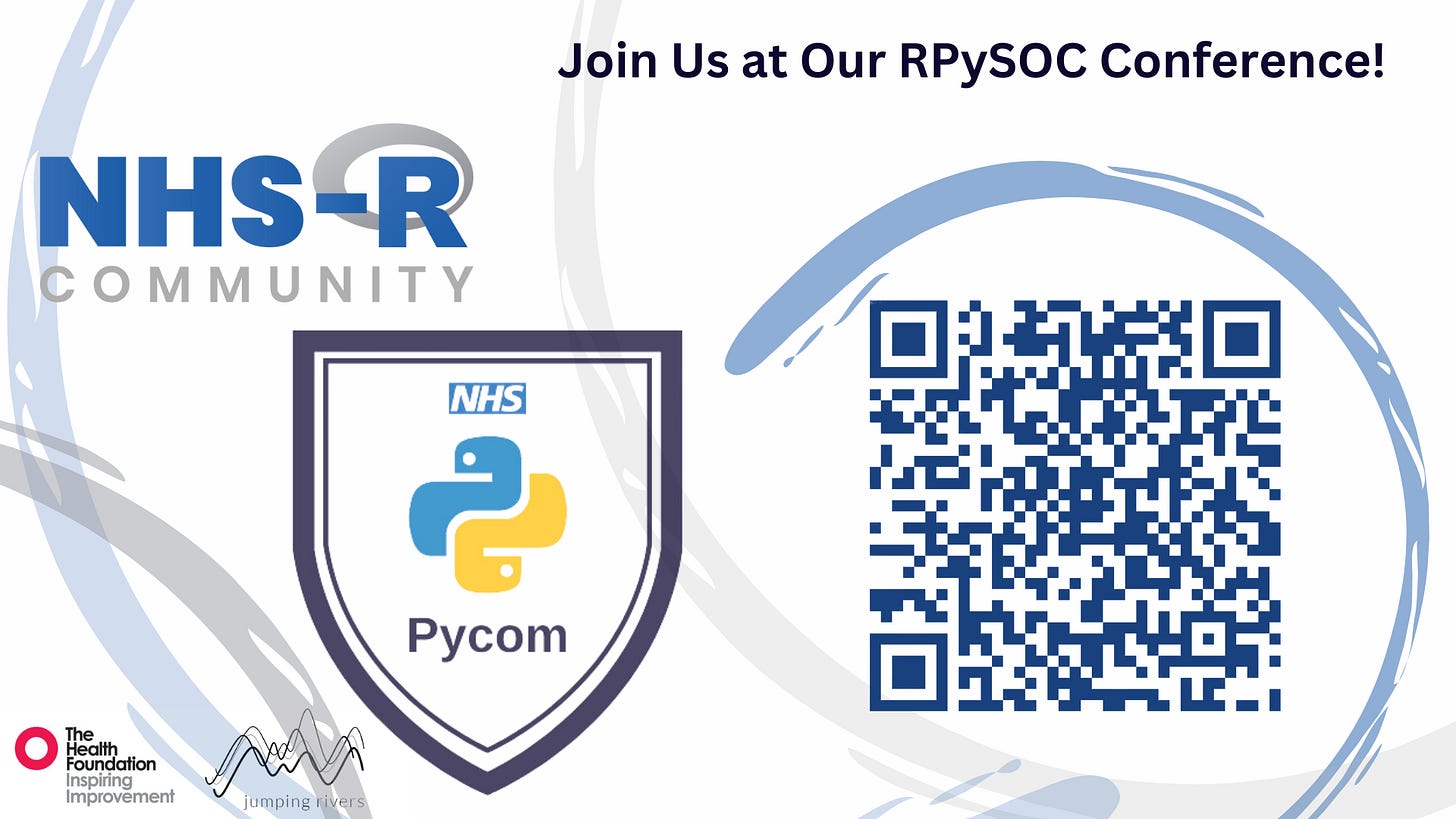September News 2024
RPySOC 2024 - 21-22 November 2024
As for last year, this year’s RPySOC24 had more abstracts submitted than we had possible slots over the two days and after a two stage process of scoring (we’ve updated details on how this was done in the NHS-R Way book), we let everyone know if they’d been accepted this month.
The quality of the abstracts was incredibly high and we had to rely on a mean average to two decimal places in order to find the cut off point. Even then, it was very close so we hope that speakers for the talks that couldn’t be offered slots at the conference will consider offering their talks through our virtual programme.
You can still sign up for free virtual tickets and join us wherever you are in the world!
YouTube

We exceeded 2.5k subscribers this month (we announced the 2,501st subscriber on Friday 13th to the Slack group)!
This was only possible through being able to share recordings regularly and these all come from volunteers - like you!
Whilst we put on webinars and workshops that people can attend live and then share recordings on YouTube we have, this month, published a couple of pre-recorded videos.
The GitHub Actions and Continuous Integration talk by Ziad Ahmed and Shivam Missar from their 6-week internship scheme provided by Nottingham Trent University (NTU) at Nottingham University Hospitals NHS Trust (kindly shared with permission):
The following was something that was going to appear in Coffee and Coding but due to times and days not being good for Seb Fox we did a pre-recording of the package {reprex} that he wanted to share.
This short is perfect for embedding into Quarto websites which is what we’ve done for our Getting Started page on the to-be-launched-soon Quarto website and you can watch it here too:
Chris Mainey ran another of his Modelling non-linear data with Generalized Additive Model workshops which was incredibly popular with slides and GitHub code:
And a special thanks to Clare Walsh for running her first Introduction to R and R Studio workshop and Simon Wellesley-Miller for his popular Intermediate R course.
For the regular workshops we will always record for the attendees to catch up but as we already have them published publicly we don’t have to share them again if you don’t want to. We value everyone’s contribution!
Slack discussions
Two particular discussions have cropped up on Slack:
The first was prompted by {usethis} now generating code in the README for using {pak} for installing packages from GitHub or the R-universe - Transitioning from devtools to remotes · Issue #2013 · r-lib/usethis (github.com). This lead to a suggestion of using R-universe which was set up by Tom Jemmett for NHS-R Community a couple of years ago. Newer packages have been added but there are a few binaries and source errors that require some maintenace.
{NHSRplotthedots} CRAN package has been in development for another release and Slack has had a couple of questions in the #proj-nhsr-plot-the-dots channel relating to developing it for {plotly} tooltips and, more recently, to include code for t/g charts as well as XMR particularly as the Making Data Count team have an Excel t-chart template on Futures NHS (which can be logged into by anyone with a Futures NHS account).
Issues and Pull Requests are always welcomed but as many of those working on development are working on other things too they may not be responded to promptly.
Online books
Mastering Statistical Process Control Charts in Healthcare by Jacob Anhøj & Mohammed Amin Mohammed, who both have contributed to NHS-R Community over the years.
The Turing Way is a comprehensive book with new additions all the time. The chapter on Missing data was added this month at the Collaboration Café which is open to anyone to join and contribute to.
Finds
Shared in the #Finds channel:
A tip (aside from reading the documentation but we are all busy so that’s not always going to happen!) is that the {dplyr} if_else() function has greater functionality than the base R ifelse() including a “missing” argument to explicitly handle NAs.
Packages
If you work with financial years (not on CRAN):
https://github.com/wurli/acadyr
https://github.com/HughParsonage/fy
on CRAN:
{phsmethods} and which we also have a blog about the package on at NHS-R Community.
Open Geography Portal API (not on CRAN):
https://github.com/dfe-analytical-services/dfeR
https://dfe-analytical-services.github.io/dfeR/reference/get_ons_api_data.html
The sharing of this find from the Government Data Science Slack connected the author of the package {boundr}, Fran Barton, to DfE. Fran has contributed functions and code from {boundr} to {NHSRpostcodetools} which currently is an API link to English postcodes.
DSLD: Data Science Looks at Discrimination https://github.com/matloff/dsld
Shiny
Do you work with R Shiny dashboards? Do ever find yourself adding a tags to add links / URLs into your content? Have you ever tried to make them open in a new tab? Have you ever been concerned about useability of the links? Have you ever been worried about security and reverse tabnabbing? No idea what reverse tabnabbing is? Questioning if it's a real phrase or one I made up? Well if you answered yes to any of those then have a look at our latest update to the dfeshiny package, this adds an `external_link()` function that does the hard work and thinking for you so your code will be neater and the link will be more accessible - what's not to love?! The package isn't on CRAN yet so you can install the GitHub version for now using: devtools::install_github("dfe-analytical-services/dfeshiny")
This functionality may move to the shinyGovstyle package in the future which has other useful functions related to Government Style components in Shiny.
Blogs (shared)
Blog on how to do good code review for analysts with links highlighted from the blog:
https://lorenzwalthert.github.io/precommit/
https://amsterdam.github.io/guides/
Resource pages
https://github.com/academic/awesome-datascience
Python
polars can now execute on GPUs https://pola.rs/posts/gpu-engine-release/
Could lead to significantly faster execution of compute bound queries.
Icons
https://healthicons.org/ can be imported using the icons package (not on CRAN) and used natively in R. They may need to be downloaded manually if your IT blocks raw.githubuser.com which is used for file calls. These are useful to pull into GT tables or presentations and the collection is fairly complete.
Thanks to: Fran Barton, John MacKintosh, James Slasor, Rhian Davies, Chris Beeley, Tom Jemmett, Zoë Turner, Jason Pott, Andreas Soteriades and Cameron Race for these finds shared in September.
Coffee and Coding

Coffee and Coding changes the day it falls every other week to try to accommodate as many people as possible. Details on the meetings, how to sign up and where the recordings are shared is in the NHS-R Way.
When we passed the central administration over to the NHS-R Community team we had considered moving to Zoom but for now we’ll continue to use the MS Teams link as the chat (which isn’t always open to everyone outside an nhs.net email unfortunately) can be quite active and Zoom doesn’t allow for conversations to keep going past the event. Whilst Slack is great for many, it’s not universally used and not everyone has access to it.





